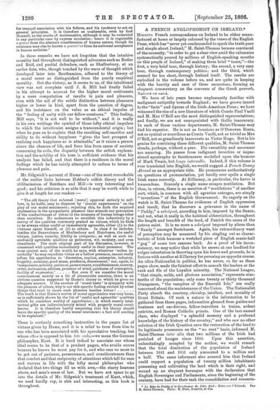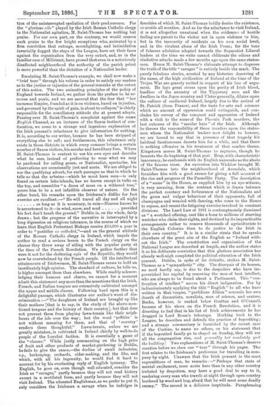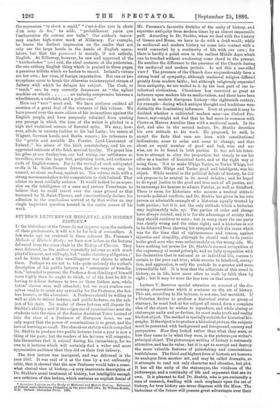A FRENCH ANGLOPHOBIST ON IRELAND.* HOLDING French correspondence on Ireland
to be either manu- factured at home or largely coloured by the views of the English Press, which has "never yet condescended to speak the truth pure and simple about Ireland," M. Saint-Thomas became convinced of the necessity, "in order to get a clear view amid the calumnies systematically poured by millions of English-speaking months on this people of Ireland," of making three brief "tours,"—the first, a very brief tour, through history; the second, a very easy tour, through contemporary politics; and the third, which seemed far too short, through Ireland itself. The results are embodied in the volume before us, and are quite in keeping with the brevity and ease of these excursions, forming an eloquent commentary on the converse of the Greek proverb, Xte1P7rel 701 ZCLACi.
We have of late years become unpleasantly familiar with malignant antipathy towards England ; we have grown inured to the "facts" and figures of the Irish-American Press ; we have witnessed the rise of a new literature of which Comte Paul Vasili and M. Max O'Rell are the most distinguished representatives; and finally, we are not unacquainted with Gallic inaccuracy. In each of these various departments, M. Saint-Thomas may find his superior. He is not as ferocious as O'Donovan Rossa, not so cynical or scurrilous as Comte Vasili, not so trivial as Max O'Rell, not so grandiosely inaccurate as Victor Hugo. But in his genius for combining these different qualities, M. Saint-Thomas stands, perhaps, without a peer. His versatility and assurance are amazing. He passes from indignant invective or impas- sioned apostrophe to facetiousness modelled upon the humour of Mark Twain, but longo intervallo. Indeed, if this volume is ever translated into English, we would suggest A French Tramp Abroad as an appropriate title. He pronounces authoritatively on questions of pronunciation, yet hardly ever spells a single Irish name correctly. At Killarney, in particular, the havoc is tremendous. Scarcely a single name escapes mutilation. But then, in return, there is no mention of "mutilations "of another sort, which, in common with all agrarian outrages, are simply " inventions " of the English Government. So eagerly on the watch is M. Saint-Thomas for evidences of English oppression and insult, that he discovers a grievance in the name of "Paddy," a sobriquet, according to him, imposed by the Saxon, and not, what it really is, the habitual abbreviation, throughout the length and breadth of the land, of Patrick the name of the patron saint. It is no more a sobriquet imposed by aliens than " Sandy " amongst Scotchmen. Again, his extraordinary want of perception may be measured by his singling out as charac- teristic of Irish humour a wretched piece of English music-hall "gag" of some two seasons back. As a proof of his incon- sistency, we may notice that while he sneers at one landlord for vulgar ostentation in throwing open his house and grounds, he is furious with another at Killarney for pursuing an opposite course. An ultra-Nationalist in politics, he has never, so far as these pages show, made the faintest effort to consult the leaders or the rank and file of the Loyalist minority. The National League, "that simple, noble, and glorious association," represents nine- tenths of the population; only some twenty or thirty thousand Orangemen, "the vampires of the Emerald Isle," are really concerned about the maintenance of the Union. The Nationalist Party absorb the courtesy, chivalry, intellect, and morality of Great Britain. Of such a nature is the information to be gathered from these pages, information gleaned from guides and boatmen and car-drivers, fellow-travellers in trains, ardent patriots, and Roman Catholic priests. One of the last-named class, who displayed "a splendid memory and a profound knowledge of the history of the country," and who saw no other solution of the Irish Question save the restoration of the land to its legitimate possessors on the "no rent" basis, informed M. Saint-Thomas inter alia that two millions of the Irish had perished of hunger since 1816. Upon this assertion, unhesitatingly accepted by the author, we would remark that the total diminution of the population of Ireland between 1841 and 1851 only amounted to a million and a half. The same informant also assured him that Ireland could support a population of twenty million inhabitants possessing and cultivating the land which is their right, and wound up an eloquent harangue with the declaration that English Sovereigns and Parliaments, since the beginning of the century, have had for their task the consolidation and consecra-
• Le Bios de Paddy et le Caucheatar. de John BuU: Notes stir l'Irlande. Par H. Saint-Thomas. Paris : B. Plon, Notu-rit, et Oie.
tion of the uninterrupted spoliation of their predecessors. For the "glorious role" played by the Irish Roman Catholic clergy in the Nationalist agitation, M. Saint-Thomas has nothing but praise. For our own part, on the contrary, we would reserve such praise to the few bright exceptions who, animated by a firm conviction that outrage, moonlighting, and intimidation invariably dogged the steps of the League, have set their faces against the organisation from the very outset, and, as in the familiar case of Millstreet, have proved that even in a notoriously disaffected neighbourhood the authority of the parish priest is more powerful than the dictation of a Nationalist leader.
Emulating M. Saint-Thomas's example, we shall now make a "brief tour" through his volume in order to satisfy our readers as to the justice or injustice of the general remarks at the outset of this notice. The two animating principles of the policy of England towards Ireland, we gather from the preface to be re- morse and panic, and we are assured that the fear that "her immense Empire, founded as it is on violence, based on injustice, and governed by the spirit of gain, is about to collapse," is chiefly responsible for the conciliatory attitude she at present adopts. Passing over M. Saint-Thomas's complaint against the name English Channel, as an instance of the Saxon instinct of con- fiscation, we come to a strange and ingenious explanation of the Irish peasant's reluctance to give information for nothing. It is, according to our writer, because he has been stripped of everything else to sell; and furthermore, this reluctance only exists in those districts in which every summer brings a certain number of Saxon visitors, his secular and hereditary foes. Where M. Saint-Thomas is content to use his own eyes and describe what he sees, instead of preferring to wear what we may be pardoned for calling green, or Nationalist, spectacles, his observations are occasionally just and acute. We are obliged to use the qualifying adverb, for such passages as that in which he tells us that the arbutus—which he must have seen—is only found on certain lake-islands, has no leaves except in tufts on the top, and resembles "a dome of moss on a withered tree," prove him to be a not infallible observer of nature. On the other hand, his remarks upon the Irishman's dislike for foot exercise are excellent :—" He will travel all day and all night as long as it is necessary, in rain—Heaven knows he is accustomed to it—in wind, snow, and mud provided his feet don't touch the ground." Dublin is, on the whole, fairly drawn ; but the progress of the narrative is interrupted by a long digression on religious tolerance, in the course of which we learn that English Protestant Bishops receive £16,000 a year in order to " ponti6er ex cathedrci,"—and on the general attitude of the Roman Catholic clergy in Ireland, which impels the author to read a serious lesson to the French clergy on the chance they threw away of siding with the popular party at the time of the French Revolution. We gather further that were it not for the sheltering cegis of the Republic, they would now be overwhelmed by the French people. Of the intellectual attainments of Irishwomen, M. Saint-Thomas seems to hold an inordinately high opinion. The standard of culture, he tells us, is higher amongst them than elsewhere. While readily acknow- ledging their humour and charm, we cannot for a moment admit this statement any more than the assertions that the Irish, French, and Italian tongues are extensively cultivated amongst the upper and middle classes. Following bard upon this is a delightful passage, which illustrates our author's want of dis- crimination :—" The daughters of Ireland are brought up like their mothers [that is to say, in the study of the above-men- tioned tongues and the history of their country], but that does not prevent them from playing lawn-tennis like their neigh- bours of the isle over the way ; but the word ' is not without meaning for them, and that of 'country' renders them thoughtful." Lawn-tennis, unless we are greatly mistaken, is cultivated in Ireland chiefly by well-to-do people of the Loyalist faction. It is essentially a game of the "classes." While justly commenting on the high price of fruit and other products of market-gardening in Dublin, he fails to give the cause,—the decline of small industries, e.g., beekeeping, orchards, cider-making, and the like, and which, with all his ingenuity, he would find it bard to account for by his everlasting reply of English tyranny. The English, he goes on, even though well educated, consider the Irish as "savages." partly because they will not read history except in a mutilated form, and partly because they will not visit Ireland. The educated Englishmen, as we prefer to put it, only considers the Irishman a savage when he indulges in
ferocities of which M. Saint-Thomas boldly denies the existence, or avoids all mention. And as for the reluctance to visit Ireland, it is not altogether unnatural when the evidence 3 of hostile feeling are patent to the visitor not in open violence to him, but in the insecurity of residents on his own social level, and in the virulent abuse of the Irish Press ; for the tone of fulsome adulation adopted towards the Separatist Liberal leaders at the time we write cannot obliterate the odious and vindictive attacks made a few months ago upon the same states- men. Hence M. Saint-Thomas's elaborate attempt to disprove the truth of the title " savages " is entirely beside the mark. The purely fabulous stories, scouted by any historian deserving of the name, of the high civilisation of Ireland at the time of the Trojan War are gravely recited in support of his line of argu- ment. He lays great stress upon the purity of Irish blood, heedless of the ancestry of the Tipperary men and the dwellers in the Joyce country and Ulster generally, dilates upon the culture of mediseval Ireland, largely due to the arrival of St. Patrick (from France), and the taste for arts and sciences which no amount of oppression could extinguish, and con- cludes his survey of the conquest and oppression of Ireland with a visit to the scene of the Phoenix Park murders, the last outcome of the "secular hate" of the Irish. Although he throws the responsibility of those murders upon the states- men whom the Nationalist leaders now delight to honour, we are bound to say that in presence of that tragedy his habitual facetiousness deserts him for a while, and that there is nothing offensive in his treatment of that sombre theme. Kingstown moves M. Saint-Thomas to raptures, though he laments the de-baptising of that port. Bray, with characteristic inaccuracy, he confounds with its English namesake as the abode of the famous vicar. An excursion into Wicklow brought M. Saint-Thomas into the neighbourhood of Avondale, which furnishes him with a good excuse for giving a full account of the rise and progress of the Parnellite Party. The description of a " scene " in the House, as supplied him by an eye-witness, is very amusing, from the contrast which is drawn between the perfect courtesy and forbearance of the Nationalists and the gross and vulgar behaviour of their opponents, full of champagne and wearied with dancing, who come to the House to repose, and resent the fatiguing exercise involved in constant divisions. The Land Law of 1881 is contemptuously dismissed as " a wretched offering, cast like a bone to millions of starving wretches who claim their rights, and destined by its impracticable arrangements rather to remove thousands of agriculturists to the English Colonies than to do justice to the Irish in their own country." It is in a similar strain that he speaks elsewhere of the great aim of the English as "Ireland with- out the Irish." The constitution and organisation of the National League are described at length, and the author states it as his deliberate conviction that this glorious association has already well-nigh completed the political education of the Irish peasant. Dublin, in spite of its defaults, strikes M. Saint- Thomas as a " sympathetic " city. The disrepair of its houses, we need hardly say, is due to the despoilers who have im- poverished her capital by removing the men of best intellect, who are always to be found about a Parliament. This "con- fiscation of intellect" moves his direst indignation. For by indiscriminately applying the title " English " to all who have written in that tongue, "perfidious Albion" conceals her own dearth of dramatists, novelists, men of science, and orators. Burke, however, is ranked below Grattan and O'Connell, because of his views on the French Revolution, and it is diverting to find that in his list of Irish achievements he has dragged in Lord Rosse's telescope. Harking back to the League, he describes and defends the practice of boycotting ; and a strange commentary is furnished by the recent case of the Curtins, to name no others, on his statement that if the boycotted family go to chapel on Sunday, they will see all the congregation rise, and peaceably but resolutely quit the building ! Two explanations of M. Saint-Thomas's deserve mention before we close our " tour " through his pages. The first relates to the Irishman's preference for travelling in com- pany by night. Unaware that the Irish peasant is the most superstitious of men, he remarks :—" Perhaps that state of mental excitement, more acute here than in any other country irritated by despotism, may have a good deal to say to it, rendering every man who travels at night through open country bordered by wood and bog, afraid that he will meet some deadly enemy." The second is a delicious ineptitude. Paraphrasing the expression "to shoot a rapid," " c'est-k-dire tuer la chute d'un coup de feu," he adds, " probablement parce que l'embareation file comme nne balle." Our author's inaccu- racy reaches high-water mark at Killarney. For example, he leaves the distinct impression on the reader that not only are the large hotels in the hands of English specu- lators, but that the personnel is mainly, if not entirely, English. At Killarney, however, he saw and approved of the " knickerboker " (sic) suit, the ideal costume of the pedestrian, the one solitary English thing which is praised in these pages, a generous tribute which we hasten to record. Ireland's virtues are her own ; her vices, of foreign importation. But one or two exceptions occur to break the otherwise uninterrupted stream of flattery with which he deluges his subject. The Cork, or " inside " car, he very correctly denounces as "the ugliest
machine on wheels an unlucky compromise between a wheelbarrow, a cabriolet, and a police-van."
Here our " tour " must end. We have perforce omitted all mention of a great deal of the contents of this volume. We have passed over the more odious of his insinuations against the English people, and have purposely refrained from quoting any passage in which the tone of the writer is pitched in a high and sustained scream of frenzied spite. We may, how- ever, allude in cursory fashion to his bad Latin ; his sneers at Wagner, German bands, and Berlin women ; his references to the "gentle and amiable Mr. Forster, Lord-Lieutenant of Ireland ;" his abuse of the Irish constabulary, and his ex- aggerated estimate of the Irish musical faculty. We grant him his gibes at our flunkeyism, our bad acting, our selfishness as travellers, even the large feet, projecting teeth, and corkscrew curls of Englishwomen. For to the revival of such antiquated scoffs is M. Saint-Thomas driven, that no weapon may be unused, no stone unslung, against us. The volume ends with a strong recommendation to his compatriots to visit Ireland. That advice we most cordially endorse. It would indeed be an asper- sion on the intelligence of a sane and serious Frenchman to believe that he could travel over the same ground as that traversed by M. Saint-Thomas, and conscientiously declare his adhesion to the conclusions arrived at by that writer on any single important question treated in the entire course of his work.




































 Previous page
Previous page